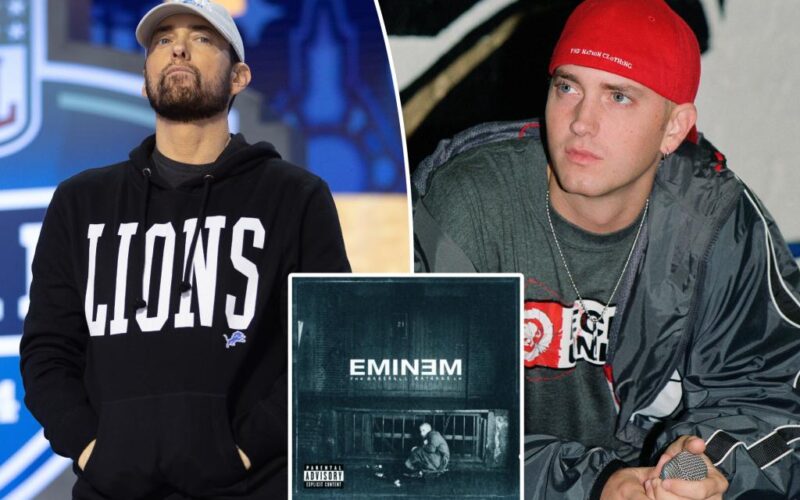True to one of his biggest hits, Eminem lost himself in the music.
That’s what happened during the making of “Kim,” the hip-hop icon’s most shocking song on his blockbuster album “The Marshall Mathers LP,” which came out 25 years ago on May 23, 2000.
The twisted murder fantasy about killing his then wife Kim Mathers became a horrorcore classic, with Eminem voicing both sides of the fatal blowup in graphic, gruesome detail.
“Now bleed, bitch, bleed! Bleed, bitch, bleed! Bleed!” spits the enraged rapper after slitting Kim’s throat.
Producer Jeff Bass said that Eminem was “f–king pissed off” about Kim — who wasn’t letting him see their daughter Hailie at that time in their tumultuous relationship — when he came into the studio for one of the drug-“fueled” sessions.
“So I came up with this very dark track, and then he literally went into the booth and started rapping about what we hear now on that record,” Bass told The Post. “He came up with that probably in an hour.”
And the recording session turned into a therapy session. “He was able to get s—t off his chest that really bothered him personally,” said Bass. “Obviously, he didn’t kill anybody, but … there’s some truth in some of it.”
As the first song written for “The Marshall Mathers LP” — which took its title from Eminem’s real name — “Kim” revealed a more personal side of the rapper who had adopted an alter ego for his previous album, 1999’s “The Slim Shady LP.” And while there were bigger hits such as “The Real Slim Shady,” “The Way I Am” and “Stan” that helped propel his third studio LP to over 11 million sales in the US, the rawness of “Kim” cut deep.
“It was not a radio record, but it was one of the most powerful records on this particular album,” said Bass. “[He] got to show the world another side of who he is.”
But the track — which was a prequel to “ ’97 Bonnie & Clyde” on “The Slim Shady LP,” where Eminem and daughter Hailie dispose of Kim’s corpse — scared Eminem’s own label.
“Interscope [Records] called for a meeting, and they were like, ‘What are we going to do with this? Now you’re pushing the envelope,’” recalled Bass. “And we’re like, ‘Well, it’s freedom of speech, so we’re allowed to say anything we want to say, right?’”
But “Kim” was deemed too graphic to even be featured on the “clean” version of “The Marshall Mathers LP” — no amount of censoring was going to get rid of its murderous narrative. So the song was replaced by the “South Park”-sampling “The Kids” on the “clean” version, leading many to buy that in addition to the explicit version in the days before streaming.
“Which is why I think it was so successful,” said Bass. “It was brilliant.”
But later in 2000, Kim sued Eminem for defamation over the song’s lyrics, and they reached a settlement.
“Kim” was the third song that Eminem recorded about his ex-wife, who he was married to from 1999 to 2001 and then again in 2006 for only a few months. The first of those tunes was “Searchin’ ” on the rapper’s 1996 indie debut “Infinite,” which Bass also produced along with his brother Mark after they discovered Eminem in their hometown of Detroit.
By the time they got to “The Marshall Mathers LP,” they were in a nonstop groove.
“We would work in the studios for, like, 20 hours a day, and we would just come up with song after song after song after song,” said Bass, who shared production duties with Dr. Dre, Mel-Man and the 45 King. “We just would keep creating to see what flowed together well on an album.”
But in addition to losing themselves in the music, they were also losing themselves in drugs.
“We were doing lots of drugs,” said Bass. “It fueled what we were coming up with … We hadn’t admitted yet that we were drug addicts. So to us, this was normal, just getting high, going in the studio, writing all this music, recording the music. Opioids — that was the choice of drug.”
Bass would continue to work with Em on 2002’s “The Eminem Show,” producing and co-writing the hits “Without Me,” “Cleanin’ Out My Closet” and “Superman.”
“We still were doing drugs, we were still doing all kinds of stupid s–t, but, you know, had major success,” he said.
Then Bass produced and co-wrote Eminem’s No. 1 smash “Lose Yourself,” from his movie “8 Mile,” which won an Oscar for Best Original Song.
“It was the biggest thing that I probably ever wrote,” he said. “For me, musically, that was my pinnacle.”
After Bass took a break from working with Eminem on 2004’s “Encore,” the pair reunited for 2009’s “Relapse,” which would be their last album together.
“We were high, and it felt like s–t was just falling apart, but that was the drugs,” said Bass. “And we didn’t have a falling-out or anything. It was just creative differences.”
Eminem released “The Marshall Mathers LP 2” in 2013, but like most sequels, it didn’t quite live up to the original. Still, Bass said, “there’s real nice, shining moments on that album.”
Although Bass hasn’t talked to Eminem “in probably 17 years,” he doesn’t rule out working together again.
“In my mind, it’s always a possibility,” he said. “And the funny thing is, our studios here in [Ferndale] Michigan are literally across the street from each other.”
But they will always share in the legacy of “The Marshall Mathers LP,” which is the second-best-selling rap album of all time — after “The Eminem Show” — and is widely considered to be the Rock & Roll Hall of Famer’s greatest work.
“At the end of the day, you know, it’s a piece of work that will just be here in perpetuity, forever,” said Bass. “It’s a piece of history, which is amazing to be a part of.”








